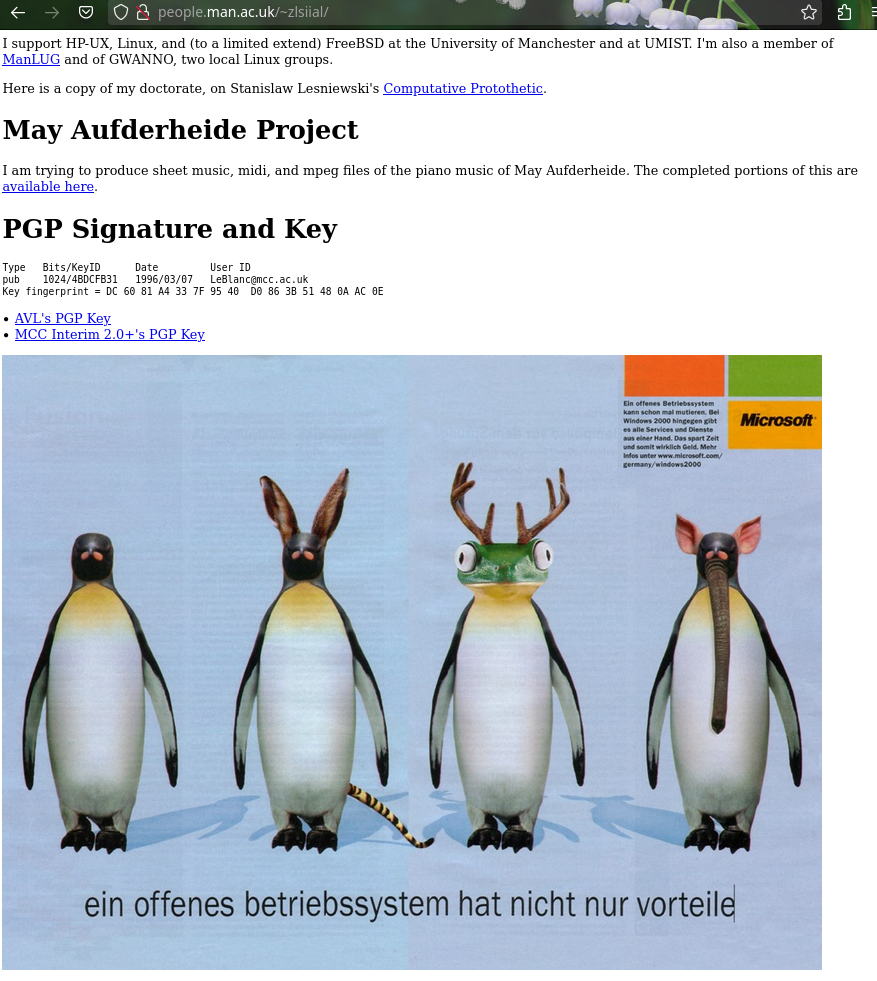Manchester Computing Centre (MCC) Made the First GNU/Linux Distro, But You Probably Never Heard of It
FOR nearly a fortnight I've looked forward to reading this article/interview with Owen Le Blanc (LWN puts articles behind a time-limited paywall), a former colleague at MCC, where I worked for 3 or 4 years. Owen Le Blanc and I didn't work closely, but we talked a bit or chatted past the corridors. He was unique because of his voice and accent (New Orleans if I still remember correctly). He had already earned his Ph.D. (he still has his thesis online in his fossilised homepage at people.man.ac.uk) and accomplished a lot towards GNU/Linux or GNU+Linux (yes, GNU and Linux). When RMS visited Manchester (he was in the UK last week) it was pointed out to him that the first GNU/Linux distro (combining the GNU programs with a bootable Linux kernel) was Le Blanc's work. Nevertheless, many people never knew this (not even at MCC). Le Blanc was just very ordinary staff and his distro, named after the employer, never became famous, just "a first" (like the first programmable computer, also a Manchester boasting right).
Manchester 'suits' were happy to boast about Alan Turing and "the Baby" (making huge public events to commemorate both, celebrating anniversaries), not about anything related to Free software. Remember that the co-founder of WordPress is also from here, Stockport (Greater Manchester) and I met him for coffee across the road from the Turing/Kilburn building more than 20 years ago. It's now known as Manchester Museum and the coffee place is still there, now Museum Café (Manchester Museum), not Café Muse.
Manchester officials ought to make more 'noise' about Manchester's role in Free software. But follow the money...
The interview and article were done by Joe Brockmeier (Slashdot, SUSE, Red Hat etc.) and the comments are just as good.
The following part stood out:
With other more ambitious and polished Linux distributions available, Le Blanc focused his attention on managing university servers and supporting Linux applications for MCC—later Information Technology Services (ITS)—users. All of the servers ran Debian, and he encouraged users to run Ubuntu—which he prefers for desktops as well. He also supported Scientific Linux for the computer science and mathematics department, but said that became harder and harder to sustain because it was "always a bit behind for those who wanted the latest versions of things". He also continued to promote Linux and said that he is still involved in open-source projects, such as LilyPond, today "but more as a user and support person than as a developer".Despite being the home of the first Linux distribution, Le Blanc said, the University of Manchester was always a bit reluctant to use open-source software and he found himself "
spending more and more energy to defend what we had". He said that there is still too much reluctance in universities, governments, and businesses to use free and open-source software or anything that doesn't come with a price tag. (LWN covered some of hurdles for open-source adoption in Mexican government in March.)This despite the fact that much of the commercial support for "industry standard" software is pretty awful. Of course, when you have systems making use of open source/free software components, then you need local expertise to manage and support them, and this goes against the belief that it's safest to have systems for which you can easily buy support, because they use out-of-the box components put together according to the manual. Although this approach produces poorer quality systems that cost more in the long run to maintain and update, it's very hard to convince (non-technical) higher managers of this.In 2016, Le Blanc accepted voluntary severance from ITS and moved on to teaching, where he is still active.
Linux would not have made it this far without Le Blanc—and others like him—making incremental contributions that paved the way for more people to use and improve Linux. MCC Interim Linux did not last long, but it was an important stepping stone on the path to longer-lived distributions like Debian.
The comments are also relevant and some usernames are recognisable. Some were in Manchester at the time. One person wrote: "I'm very happy to have been at Manchester in the 1990s but I was probably little known to Owen. I too saw the push for "industry standard" solutions, in particular in the acquisition of very expensive SGI hardware just to run a website. With hindsight I wonder if the University wasn't motivated for these solutions as they pushed up grant applications, the University receiving a fixed cut of any awarded grant money. Congratulations to LWN for singing the praises of the likes of Owen, the MCC machines running the transparent proxy caching servers I was always immensely impressed by."
Back then the main competition wasn't Microsoft. It's important to remember that and remind people of it.
As an associate put it: "A huge and growing problem is the revisionism being spread that Microsoft is the norm and not a johnny-come-lately outlier. That is in part enabled by people not knowing jack diddly shit about computers and when they see what is on their desk as the alpha and omega of the complex network services and software which they are really using day in and day out".
When I worked at MCC we supported GNU/Linux and even BSD users. Windows XP had barely been adopted by anybody and Microsoft at the server room was an anomaly, not the norm.
As the associate recalls, "FOSS was defacto at universities through to the early 00s. Microsoft got a foot in the door in the late 90s and used the intervening time to maneuver politically until there was a global purge of IT departments 2003 - 2008".
They also did that in my faculty. Microsoft is barely a company; it's like a cult of saboteurs, trying to stick together and undermine things in order to enrich themselves. Microsoft has many tentacles like partners, who hope to enjoy the spoils of war or loot.
"The main goal was to attack the teachers next," the associate concludes, "to ensure that the could not get the resources and services needed to teach. Those that toed the line survived. The ones with integrity left or were 'eased out' by the administrations which obeyed the Microsofters in allowing them to set the curricula indirectly at first."
That's also what happened at MCC. Quoting the above part: "Despite being the home of the first Linux distribution, Le Blanc said, the University of Manchester was always a bit reluctant to use open-source software and he found himself "spending more and more energy to defend what we had
"."
He had to waste his time dealing with all sorts of annoyances instead of getting stuff done. MCC should have given him an award, but instead they pushed him out.
As Andy Farnell, Ed Nevard, and Helen Plews put it a month ago when eulogising Ross Anderson: "Ross was not liked by the university to which he devoted his life. The fact is they wanted rid of him by forced retirement. At an institution taking funding from Elon Musk and some morally questionable technology organisations, Ross ruffled feathers with his plain integrity. He was not, however, an "activist" - which made the integrity all the more galling for some."
I stopped working for universities in 2012 (they got polluted, even overtaken by foreign companies like Google and Intel, not just Microsoft) though in Sirius Open Source we had many universities as clients. It's not only Microsoft that ruined them, but Microsoft did play a considerable role, even in Victoria University of Manchester (I did my Ph.D. there before it merged with UMIST, worsening the impact of Microsoft).
People like Owen are barely remembered, not because they didn't do valuable work but because they didn't suck up to "The Establishment".
People who value facts and science (or don't get information "from television") will value what Owen did. He'll never be put on a pedestal or some TV program, but those aren't yardsticks of true success when the mass media is owned by the likes of Jeff Bezos and Bill Gates, basically a rich thief who lies about his accomplishments and those of others. █


